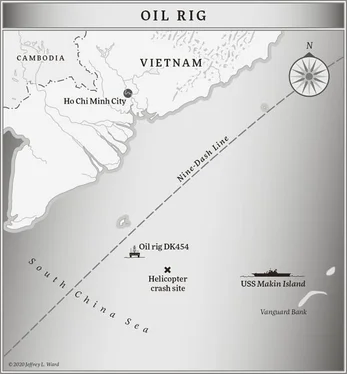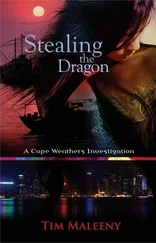Pain and the drugs had turned her brain to mush. Her thoughts were fuzzy, unhinged and without defined edges. Nothing made sense. Everything hurt.
Was this random? Did they plan to take her somewhere and rape her? Panic bore down, crushing her chest. No. Rapists didn’t tie your feet together. Did they ?
Come on, Leigh. Think. They trained you for this at The Farm.
No, they didn’t. Not really. There was no way to train for something this horrific, this futile.
They wanted her awake. That meant they wanted to question her. She blinked, trying to remember. Adam. They would want to know about Adam.
The man in the gray hat sat on an overturned bucket behind the driver. He reached down to pat her cheek, gently at first. Hard enough to rattle her teeth when she clenched her eyes.
He’d cocked his felt hat back, revealing a high forehead and passive eyes, accustomed to hiding their cruelty. “We are going for a drive in the countryside.” He smiled benignly. “How long we drive is up to you.”
She licked her lips, then craned her neck to get a better look at him, trying to speak. He raised a hand to shush her. “I do not want to kill you,” he said. “But it is important that you know I will.”
“Just get to—”
The man in the hat nodded to his companions. The short one, Pukwudgie, flipped her on her side, and then pressed his boot to her injured knee, bearing down hard, slowly, like grinding out a cigarette.
She screamed and kept screaming until the one in the hat kicked her in the face.
He took a folding knife from his pocket. It was small, with a turned-down Wharncliffe blade. The needle-sharp point and scalpel edge allowed him to perform extremely intricate work. “Listen to me carefully. I will now ask you a few questions about your conversation with Urkesh Beg, the Uyghur man you spoke with today. If you lie, I will make a small cut, somewhere on your body. I have not decided where yet. If you refuse to talk, I will do the same.” He gave a long, sad sigh and then leaned back on the bucket, crossing his knees, bouncing the butt of the knife against his thigh, almost as an afterthought. “In my experience, the process works better if it is done slowly, so you have more time to consider your answers between each incision. Unfortunately, I do not have much time. How did you learn of Urkesh Beg?”
Murphy began to sob. “I … I don’t know what you’re talking about.”
The man’s hand flashed, like a viper, his blade neatly bisecting the brow over her left eye. It stung, but the pain wasn’t as horrible as she’d anticipated. Blood poured from the wound, burning her eye, a constant reminder that she’d been cut.
He prodded her with the toe of his boot. “I have many questions and little time.” He waved the blade over the top of her body. “It is a shame to ruin such beautiful skin.”
Head lolling, cheek against the cold steel of the floor, Leigh Murphy clenched her eyes shut. Tears pressed from her lashes, mingling with the blood.
Pukwudgie readied another syringe.
Leigh Murphy began to tremble, her entire body wracked with sobs. Oh, Adam. You told me too much.
“I may have a location,” Fu Bohai said when he telephoned Admiral Zheng four hours later.
The American CIA officer had been incredibly resilient. She’d borne much of the pain in silence, passing out much later than others to whom he’d given the same treatment. In the end, no one could hold up to drugs and pain. The mind simply let go.
The admiral grew animated on the other end of the line as Fu repeated the details of what she’d given up.
“You must go at once,” the admiral said, breathless. “Take as many men as you need. Kill the Wuming filth, kill the Americans, or do not. I do not care. But you must bring me Medina Tohti alive and intact. I cannot stress that enough. I need her coherent and talking. Now go, take the company plane. I want you at this mysterious lake as soon as humanly possible. Before that would be even better.”
“I understand,” Fu said. “But …”
“What is it?”
“Forgive me,” Fu said. “But please trust my expertise in this area. Even the most determined person will eventually talk, but the more determined one is, they are often far from coherent when they do finally break.”
Admiral Zheng scoffed. “Do not concern yourself with that. Just bring Medina Tohti to me. Your expertise is not required beyond finding her and getting her to my office. Harsh methods will not be necessary. Her daughter and sister are in Kashgar. Their safety will be all the incentive she needs to assist us.”
38
Clark’s eye flicked open at the sound of shuffling footsteps—too big and heavy to be a rat. The room was hazy with the muted gray light of an overcast dawn outside the tiny window. He moved slowly, feeling the familiar pops and cracks that greeted each morning even when he slept in a soft bed. A cloud of white vapor blossomed around his face when he breathed.
The sound bounced off the clay walls, making it difficult to pinpoint where it was coming from. He caught movement in the shadows, tensed, then relaxed a hair, falling back into his blanket when Hala’s silhouette came into focus, her small face framed by the white fake fur ruff of her coat.
“You okay?”
“John …”
The urgency in her voice brought him fully awake. He sat upright, throwing off his blanket.
“What is it?” he whispered, still raspy from his sleep.
Hala went to the window. She had to tiptoe to peek out. She ducked her head away as soon as she’d looked. “He’s coming!”
Clark rolled to his feet and drew the girl near so she could explain quietly. “Who’s coming?”
“I’m sorry,” she said again. “I had to pee. There was a man driving by on the road. I think he had stopped to pee as well. I did not think he saw me at first, but then he called out. I’m very sorry. It was an accident—”
“It’s okay,” Clark said. “Is he a policeman?”
She shook her head. “No. I do not think so.”
“Is he alone?”
She nodded. “I saw his car. There was no one else. Maybe he is—”
A wary voice called from outside the walls of the caravanserai. She was right. The man was Uyghur—and he was close.
Clark held up his hand to shush her while the man spoke, then leaned in so she could whisper in his ear to translate.
“He … He wants to know what I am doing out here all by myself.”
The man outside spoke again, louder this time, bolder, more demanding.
Hala gasped and began to shake at what she heard.
“What is it?” Clark asked.
“He knows the Bingtuan are looking for a runaway child,” she said. “He said he will not call them if I do not fight him.” She looked up at Clark. “He is a very bad man.”
“Yes, he is,” Clark said. He stood, stepping sideways inch by inch, “cutting the pie” until he brought the shadowed figure outside into view.
He was dressed like a workingman—dark trousers, white shirt, dark sport jacket under a heavier wool coat. He wore a black fur hat with the earflaps down against the morning cold. Clark estimated him to be in his early thirties, but it was difficult to tell in this part of the world. Life in western China tended to age people beyond their years. He could just as easily have been twenty-five.
Clark assessed the man quickly as an opponent. He didn’t appear to have a weapon. His hands were empty. No cell phone at the ready. He could have already called and reported his find, but Clark doubted that. Not if he wanted to be alone with his newly found young treasure. No, he’d wait until he was done—or, more likely, he’d forgo calling the police at all. He’d just do what he wanted and leave. Fugitives didn’t call the police, if he even let her live.
Читать дальше











![Александр Ирвин - Tom Clancy’s The Division 2. Фальшивый рассвет [litres]](/books/417744/aleksandr-irvin-tom-clancy-s-the-division-2-falsh-thumb.webp)
